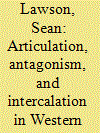|
|
|
Sort Order |
|
|
|
Items / Page
|
|
|
|
|
|
|
| Srl | Item |
| 1 |
ID:
104024


|
|
|
|
|
| Publication |
2011.
|
| Summary/Abstract |
This article provides a discursive grounding for understanding the construction of military imaginaries by adding the concepts of 'antagonism' and 'intercalation' to articulation theory. By examining the cases of industrial-mechanized warfare theory and network-centric warfare theory through the lens of this expanded articulation theory, it is argued that military imaginaries often serve to define and link conceptions of science, technology, society, economy, war, and military organization, thought, and practice into a unified image of the larger security environment - that is, the military imaginary. Military imaginaries often share a common narrative structure that privileges co-periodized change among the elements of the articulation, resulting in the phenomenon of 'antagonism' serving as a generic threat used to justify military modernization and even the use of force.
|
|
|
|
|
|
|
|
|
|
|
|
|
|
|
|
| 2 |
ID:
074965


|
|
|
|
|
| Publication |
2006.
|
| Summary/Abstract |
In this paper, I examine how Articulation Theory and Critical Discourse Analysis can be used to examine the Bush administration's 'Freedom Doctrine' as it appears in official speeches, press releases, and interviews. I also look at possible alternatives to the dominant militaristic interpretation of international events and foreign policy, and recommend other areas of research and study related to the Bush doctrine and the discursive practices that surround it. My overall argument, however, is that this particular doctrine has nothing to do with freedom, liberty, or justice as claimed by the Bush government. Rather, I argue that this doctrine is actually a veiled attempt to exert and extend America's economic, military, and political hegemony globally. We need a new approach to national security-a bold, progressive internationalism that stands in stark contrast to the too often belligerent and myopic unilateralism of the Bush Administration.(John F. Kerry)
|
|
|
|
|
|
|
|
|
|
|
|
|
|
|
|
|
|
|
|
|